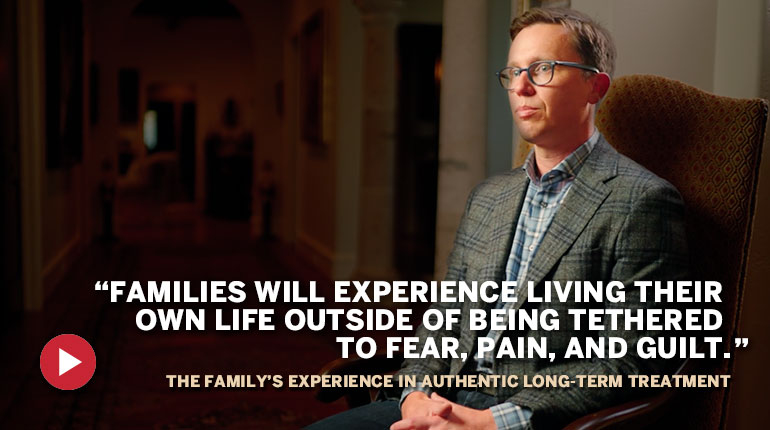Burning Tree Ranch Team Shares What it’s Like Working with Families to Achieve a Life of Excellence
Video Summary:
The leadership team at Burning Tree Ranch discusses the role of family involvement in the addiction treatment process. The speakers include Brook McKenzie (Chief Operating Officer), Dawn Wilson (Director of Transition Services), Jesse Earwood (Executive Director), and Meghan Bohlman (Clinical Director).
They emphasize that addiction is a family illness, requiring active participation and recovery work from all family members, not just the individual in treatment.
In working directly with families on their own recovery, Burning Tree Ranch takes a comprehensive approach to treating both the individual and the family system together. Through this approach, both families and clients undergo a powerful and transformative experience in achieving their own life of excellence.
Read: Video Transcript
[Video opens with Brook McKenzie, LCDC, Chief Operating Officer]
At Burning Tree Ranch, we expect the family members are gonna take up part of the burden of the treatment experience for their loved one. We need the family member participating at a very high level. At the same high level we expect their loved one in treatment.
We enroll our families to work hard. We ask them to take direction, and follow suggestions, and to do difficult things that they may not understand. While they may not understand everything that we’re asking them to do, we ask for them to do it anyways, and to have an open mind so that they can have a brand new experience with recovery,
[Enter Dawn Wilson, Director of Transition Services]
Well, alcoholism and drug addiction are family illnesses. A lot of times, someone will think, ‘Oh well, it’s just the addict or the alcoholic needs to get help, and then everything will be okay.’
And the truth of the matter is that everyone in the entire family system is involved. So that means that every person in the family system needs to work their own program of recovery in order to get well.
[Enter Jesse Earwood, Executive Director]
The family system didn’t get to where they are as a family unit with just the alcoholic doing what they’re doing. The clinician is going to communicate with the family the whole way about what’s appropriate to talk about, when’s it appropriate to talk about it – and we’re gonna have lots of opportunities to engage not only the client, but the family and their communication style; what’s healthy and what’s not.
[Re-enter Dawn Wilson]
A lot of times, if the family has not started to work the steps on their own, you will see the possibility of the family system returning to the status quo. So, I’ve spent a lot of time coaching the family, encouraging the family, to get involved in their own program of recovery so that the entire system can actually be different.
[Enter Meghan Bohlman, Clinical Director]
It’s important for families to participate in our family workshop prior to visitation so that they can get to know our treatment team. It’s really the first time families are introduced to the clinical team, and to the director of a lot of our programs. They get to hear from our founder directly. They get to talk to our executive director about the ins and outs and how to apply those principles. They get to hear from me about the daily schedule, the clinical approach, how we use the entire team to treat the whole of the client – trauma, clinical issues, step work. And they also get to hear from the director of transition services about what the aftercare piece looks like and why it’s so important to be dovetailed with our residential program.
Families once beginning to work their own program will begin to experience some freedom. They will actually sleep better. They will actually begin to do things like go on vacations or take trips or not worry about where their phone is on Sundays because they might miss that five minute phone call.
Families will experience living their own life outside of being tethered to fear, and pain, and guilt. It allows them to take their life back and really I see families start to realize that they have really put their own lives on hold without ever realizing that’s the new status quo.
[Re-enter Brook McKenzie]
At Burning Tree Ranch, we really do understand that our families have been through a lot. They’ve been through a lot of pain, a lot of disappointment, a lot of discouragement. Oftentimes they’re living in a tremendous amount of fear about their loved ones’ ability to ever recover and ever be okay again.
Families ask us all the time what’s different about the Burning Tree Ranch program, and I’m so fortunate to be able to tell them that what’s different is that we’re not only there to assist their loved one in achieving a life of excellence beyond sobriety, we’re also able to assist them in achieving their own life of excellence, and their own freedom.





